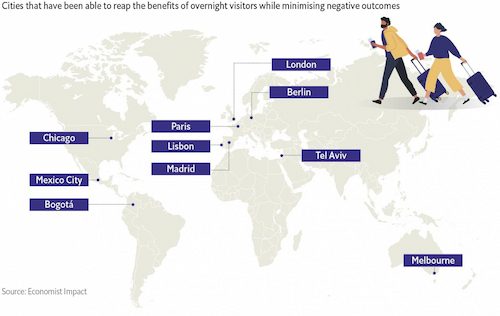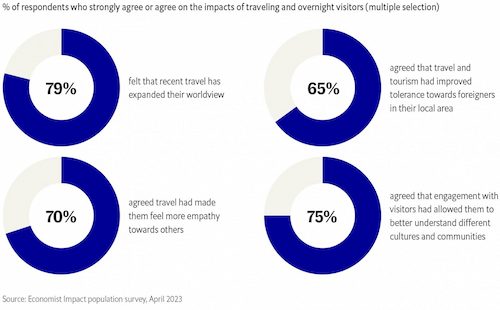GSTC Chair, Luigi Cabrini participated in participate the Economist Impact workshop last year, tied to Economist Impact’s « Destination Always » research programme, supported by Booking.com.
Travel and tourism generates US$2.5trn in direct revenues globally, helping to provide economic opportunities to people and destinations, build intercultural understanding and foster appreciation of the natural world. But there are also negative consequences–from overcrowding in popular destinations to concerns around climate change, environmental conservation and preservation of cultural heritage.
“Destination always” measures the economic, environmental and social impacts of overnight stays in 50 cities and regions globally. It unpacks the impact of overnight visitors on economic, environmental and social outcomes–like employment, air pollution and social tolerance–and explores the tools with which stakeholders can manage the tradeoffs.
Key findings include:
Berlin, Paris, London, Melbourne and Chicago have been among the most successful in both attracting overnight visitors and managing environmental and socioeconomic pressures.
Through a benchmarking exercise focused on the 38 cities included in the study, Economist Impact identified the destinations that have reaped the economic benefits of the visitor economy, while improving environmental and social outcomes. Berlin, Chicago and Lisbon increased their travel and tourism revenue by more than two-thirds in the decade prior to the COVID-19 pandemic, roughly halved their unemployment rates and cut air pollution by more than a third. Paris and Melbourne achieved even more impressive reductions in pollution—50% and 67%, respectively—while increasing travel and tourism revenue by at least 25%. In Latin America, Bogotá and Mexico City have made substantial social strides, especially around addressing gender inequality. The large cities in Southeast Asia—including Bangkok, Jakarta and Kuala Lumpur— have captured significant economic benefits from increased overnight stays, but have room for improvement when it comes to managing environmental and social challenges like air quality or inequality and therefore fall out of the top 10 in the rankings.
The top 10

Overnight visitors have enormous potential to catalyse progress in achieving gender equity worldwide.
Nearly two-thirds (63%) of respondents in their global population survey felt that travel and tourism had helped to improve gender equity in their local area. These perceptions are supported by our national-level model, which found that a 1% increase in international tourist arrivals was linked to a 0.02% improvement in a geography’s score in the World Economic Forum’s Global Gender Gap report. Additionally, women constitute 54% of the global travel and tourism workforce—compared with 39% of the workforce across the broader economy—and the gender wage gap is smaller in this sector than in other industries, which may contribute to the broader empowerment of women.
Despite concerns that visitors erode local culture, increased overnight visitors are improving social tolerance.
Three-quarters of respondents in their population survey agreed that engagement with visitors had allowed them to better understand different cultures and communities and expanded their worldview, while two-thirds agreed that visitors to their communities have positively impacted locals’ tolerance towards foreigners. This is in contrast to the perception of almost half (48%) of respondents that travel and tourism has contributed to the loss of local culture, compared with 31% who disagreed.
Rising tolerance

Matus Samel, senior manager, sustainability at Economist Impact commented: “The report highlights there is no silver bullet when it comes to harnessing the economic impacts of overnight stays. Instead geographies and stakeholders need to get the right policy mix that fits local contexts and challenges. The findings illustrate that high-income international cities tend to be finding this balance, but at a fundamental level, local businesses and employees need support and the right enabling environment to be able to adequately provide the goods and services visitors want and need.”
Continue to read the full report on the original article at Impact.economist.com here: https://impact.economist.com/perspectives/economic-development/destination-always




